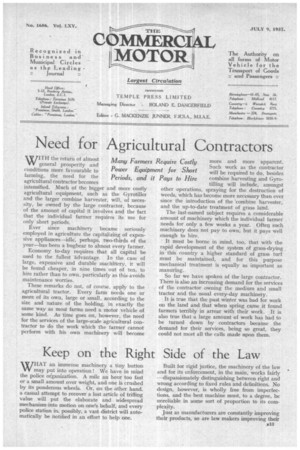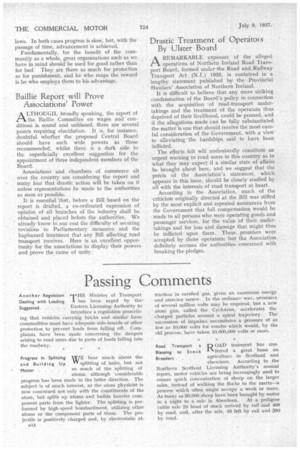Keep on the Right Side of the Law
Page 23

Page 24

If you've noticed an error in this article please click here to report it so we can fix it.
WHAT an immense machinery a tiny button may put into operation ! We have in mind the police aganization. A mile an hour too fast or a small amount over weight, and one is crushed by its ponderous wheels. Or, on the other hand, a casual attempt to recover a lost article of trifling value will put the elaborate and widespread mechanisminto motion on one's behalf, and every police station in, possibly, a vast district will automatically be notified in an effort to help one. Built for rigid justice, the machinery of the law and for its enforcement, in the main, works fairly —dispassionately distinguishing between right and wrong according to fixed rules and definitions. No design,. however, is wholly free from imperfections, and the best machine must, to a degree, be unreliable in some sort of proportion to its complexity. Just as manufacturers are constantly improving their products, so are law makers improving their B13 laws. In both cases progress is slow, but, with the passage of time, advancement is achieved. .
Fundamentally, for the benefit of the community as a whole, great organizations such as we have in mind should be used for good rather than for bad: They are there as much for protection as for punishment, and he who reaps the reward is he who employs them to his advantage.
Baillie Report will Prove Associations' Power
ALTHOUGH, broadly speaking, the report of the Baillie Committee on wages and condition S is sound and unbiased, there are several points requiring elucidation. It is, for instance, doubtful whether the proposed Central Board should have such wide powers as those recommended, whilst there is a dark side to the superficially excellent suggestion for the appointment of three independent members of the Board.
Associations and chambers of commerce all . over the country are considering the report and many fear that drastic action will be taken on it unless representations be made to the authorities so soon as possible.
It is essential 'that, before a Bill based on the report is drafted, a co-ordinated expression of opinion of all branches of the industry shall be obtained and placed before the authorities. We already know to our cost the difficulty of securing revisions to Parliamentary measures and the haphazard treatment that any Bill affecting road transport receives. Here is an excellent opportunity for the associations to display their powers and prove the cause of unity.
Drastic Treatment of Operators By Ulster Board
AREMARKABLE exposure of the alleged operations of Northern Ireland Road Transport Board, formed under the Road and, Railway Transport Act (N.I.) 1935, is contained in a lengthy statement published by the Provincial Hauliers' Association of Northern Ireland.
It is difficult to believe that any more striking condemnation of the Board's policy in connection with the acquisition of road-transport undertakings and the treatment of the operators thus deprived of their livelihood, could be penned, and if the allegations made can be fully substantiated the matter is one that should receive the most careful consideration of the Government, with a view to alleviating 'the hardships said to have been inflicted.
The effects felt will undoubtedly constitute an urgent warning to road users in this country as to what they may expect if a similar state of affairs be brought about here, and we suggest that the précis of the Association's statement, which appears in this issue, should be closely studied by all with the interests of road transport at heart.
According to the Association, much of the criticism originally directed at the Bill was stifled by the most explicit and repeated assurances from the Government that full compensation would be made to all persons who were operating goods and passenger services, for the value 'of their undertakings and for loss and damage that might thus be inflicted upon them. These, promises were accepted by those operators; but the Association definitely accuses the authorities concerned with breaking the pledges.




















































































